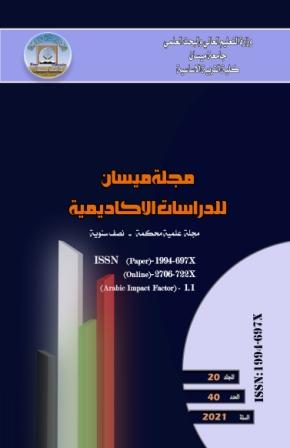Effect of certain nutritional markers on neonatal outcome
Abstract
Several micronutrient deficiencies are well established to be contributors to abnormal prenatal development and pregnancy outcomes. We aimed to correlate these poor neonatal outcomes with nutritional status of their mothers during pregnancy.
Subjects and Methods :
A total of 100 pregnant women at time of delivery with their newborns were investigated for their PCV , blood film , S.Ca and S.Po4 in the obstetrical ward in Al-Khadhimya teaching hospital during the period between the 15th of March to the 15th of May 2009. Vitamin D status is estimated from the levels of S.Ca and S.Po4 . the questionare involved questions about age , parity, economy,educational level, and ANC of the mothers , and also sex , GA, anthropometric measures and outcomes of the newborns.
Results :
From 100 pregnant women who were included in our study , 74 of them delivered by NVDand 26 delivered by C/S with the product of 54 male and 46 female . eleven of the newborns were preterms and another three of them were small for gestational age, with one newborn presented with birth asphyxia and one was stillborn. Forty percent of mothers were anemic , from the anemic mothers only 42.5% were with hypochromic microcytic anemia. Non of the newborns presented with anemia. Thirty-two percent of
mothers had hypovitaminosis D and thirty-five percent of newborns also. There was strong correlation between maternal and neonatal vitamin D estimated level. Both anemia and/ or vitamin D deficiency had negative effect on the anthropometric measures of the newborns. Presence of both deficiencies ( anemia and vitamin D deficiency ) at the same time led to more adverse neonatal outcomes.
Conclusion:
1- anemia and /or low vitamin D status affected badly neonatal outcomes interms of anthropometric measures and prematurity.
2- malnurished mothers even when delivered full terms , although such babies were in the normal anthropometric range , but they were much lower than babies of well nurished mothers.
Downloads
The copyright is also the copyright of the magazine only.
All articles published in our magazine are subject to license terms
Creative Commons Attribution(CC BY-NC-ND 4.0) This license permits the content to be reproduced, redistributed and reused in whole or in part for any purpose free of charge, without any permission from the author(s), researcher or student.
Works submitted to Maysan Journal of Academic Studies for publication in the journal (CC BY-NC-ND 4.0) license terms. Where available content can be shared, distributed and replicated provided there is no commercial profit and appropriate credit must be given to the original source through sources or citations. It is mandatory to review any material used from other sources including shapes, tables, and images for re-use under the terms of the Creative Commons License (CC BY-NC-ND 4.0).Provided that there is no modification to the original content



